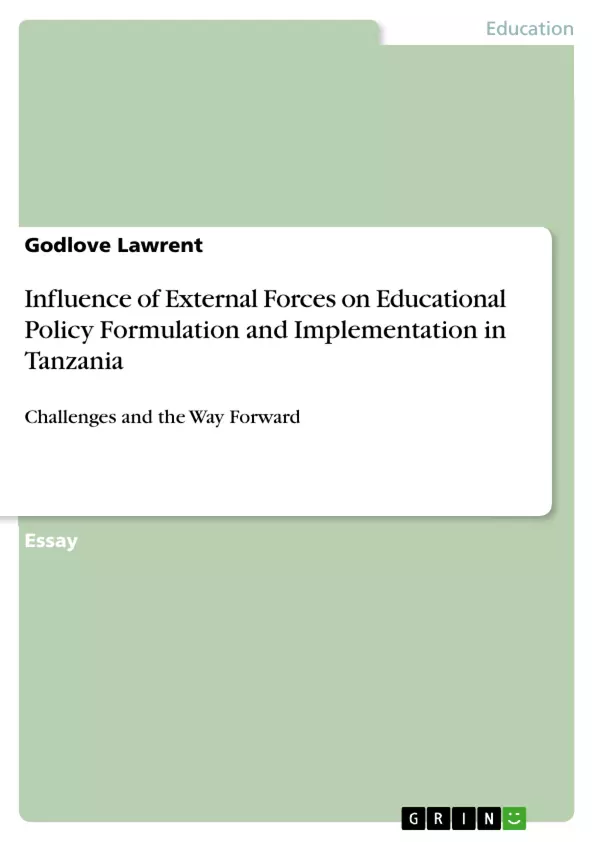This paper examines the influence external forces on educational policies formulation
and reforms in Tanzania. These forces include the international agendas, globalization,
ideology adoption and international community donors. Data were collected through
documentary reviews. The study found that most of education policies and reforms in
Tanzania are external rather than internal influence. It was further noted that even the
implementation of these policies and reforms depend entirely on donors both financially
and human resources. However, it is recognized that most of support from these forces
are oriented towards the quantitative improvement rather than quality enhancement. This
state of affair was found to affect the quality of education delivery negatively. Challenges
facing these policies and reforms were also addressed in this paper. The paper concludes
that, despite the quantitative policy achievements like the student enrolment expansion, it
is important for the responsible to improve the primary and secondary schools quality of
education as well as to address the issues of corruption for the education allocated fund
in particular.
Inhaltsverzeichnis (Table of Contents)
- Introduction
- International Agenda and Tanzania Education Policy Adoption
- Globalization and Education in Tanzania
- Ideology Adoption and its Influence on Education Policies and Reforms in Tanzania
- International Community Donors and their Influence on Educational Policies and Reforms
- Challenges Facing Education Policies and Reforms in Tanzania
- The Way Forward
- Conclusion
Zielsetzung und Themenschwerpunkte (Objectives and Key Themes)
This paper explores the influence of external forces on the formulation and implementation of educational policies and reforms in Tanzania. The study analyzes the impact of international agendas, globalization, ideology adoption, and international community donors on the Tanzanian education system. It aims to understand how these external forces have shaped educational policies and their subsequent implementation, as well as to highlight the challenges and potential solutions associated with these influences.
- Influence of External Forces on Educational Policy Formulation
- Impact of International Agendas on Education in Tanzania
- Role of Globalization in Shaping Education Policies
- Challenges and Opportunities Associated with Donor Funding in Education
- Quality of Education Delivery and Improvement Strategies
Zusammenfassung der Kapitel (Chapter Summaries)
The introduction sets the context by discussing Tanzania's post-independence development goals and the emergence of external challenges in the 1970s and 1980s. The paper then explores the influence of international agendas on Tanzanian education policy adoption, highlighting the significance of the Universal Declaration of Human Rights and the World Declaration on Education For All. The impact of globalization and the role of international donors are also discussed, exploring their influence on education policy and implementation.
Schlüsselwörter (Keywords)
The paper focuses on external forces, educational policy formulation, implementation, Tanzania, international agendas, globalization, ideology adoption, international donors, challenges, quality of education, and the way forward. The study emphasizes the complexities of education policy development and the importance of understanding the interplay of internal and external factors in shaping educational outcomes.
Frequently Asked Questions
How do external forces influence education in Tanzania?
External forces such as international donors, globalization, and international agendas shape policy formulation and provide necessary financial and human resources.
What is the impact of international donors on Tanzanian schools?
Donors often focus on quantitative improvements like enrollment expansion, which can sometimes lead to a neglect of the actual quality of education delivery.
Why is globalization a challenge for Tanzania's education policy?
Globalization requires the adoption of international standards and ideologies, which may not always align with local internal needs and resources.
What are the main findings regarding the quality of education?
The study found that while student numbers have increased, the quality of education in primary and secondary schools needs significant improvement to be effective.
How does corruption affect the education system in Tanzania?
Corruption in the allocation of education funds is a major challenge that hinders the effective implementation of reforms and the improvement of school quality.
- Quote paper
- Godlove Lawrent (Author), 2012, Influence of External Forces on Educational Policy Formulation and Implementation in Tanzania, Munich, GRIN Verlag, https://www.grin.com/document/191431



